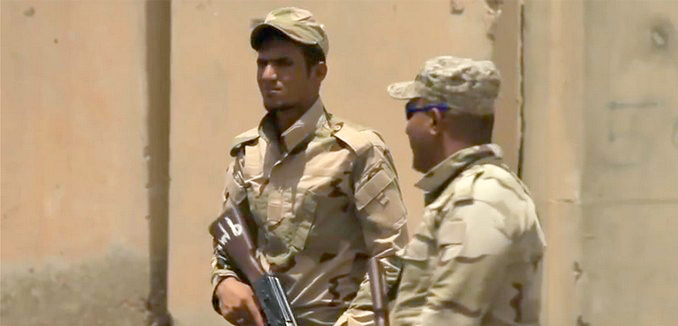U.S. intelligence officials are disputing the Obama administration’s claim that Iran was not involved in the kidnapping of three American contractors in Iraq earlier this month, Jay Solomon of The Wall Street Journal reported (Google link) Tuesday.
The three contractors were abducted in Baghdad on January 16, the same day that Iran released American hostages Jason Rezaian, Saeed Abedini, Amir Hekmati, and two others. While Iraqi authorities say the men were taken by local Shiite militias, which are heavily supported by Iran, Obama administration officials have asserted that there is no indication that the Islamic Republic was behind the kidnappings, and added that Tehran may be able to use its influence with the Shiite militias to obtain the contractors’ freedom. Secretary of State John Kerry said that he spoke with Iranian Foreign Minister Mohammad Javad Zarif on the matter, though Zarif claimed that he had no information on the Americans’ whereabouts.
However, some U.S. intelligence officials “take a more skeptical view of Iran’s willingness to play a role in gaining the Americans’ freedom,” according to the Journal. Shiite militias in Iraq have worked closely with Iran’s Islamic Revolutionary Guard Corps (IRGC) in recent years, and the Defense Department believes that the IRGC and one of the Iraqi militias– known as the League of the Righteous or Asa’ib Ahl al-Haq– suspected of taking the contractors were also behind the kidnapping and killing of five American soldiers in Karbala in 2007.
“Everything points to it,” said one intelligence official in reference to the League of the Righteous’ involvement in the abduction. “That’s exactly what they do, and threatened to do.”
That official’s comments were reinforced by Scott Modell, a former CIA officer and Iran expert, who said that “The reported kidnapping of Americans in Baghdad…should come as no surprise to those who have been closely monitoring the messaging of Shia militia groups backed by Iran.”
“No group has been more vocal in its threats to U.S. forces in Iraq than Asa’ib Ahl al-Haq, and none more steadfast in its loyalty to IRGC hardliners,” Modell added.
Council on Foreign Relations senior fellow Max Boot and Michael Pregent, a former U.S. Army intelligence officer and an adjunct fellow at the Hudson Institute, wrote in The Washington Post earlier this week that “Officials in Washington had hoped the Iranian government would tell the militia group to hold off because of all the negotiations surrounding the prisoner swap that saw the release of five Americans.
“[This] suggests that the U.S. government had some advance warning of the danger of Americans being kidnapped in Iraq but chose to ignore it in the hopes that Iran would restrain its proxies,” Boot and Pregent added, observing that this further indicates that the Obama administration was and is aware of the ties Iraqi Shiite militias have to Tehran.
According to former American officials who spoke to the Journal, Iran’s recent behavior shows that, contrary to Obama administration’s hopes “for improved relations with Tehran,” the regime’s hostility towards the U.S. has not diminished in the wake of the nuclear deal. The actions include the testing of two ballistic missiles, the firing of rockets near an American aircraft carrier, and the seizure of two U.S. naval boasts and ten sailors earlier this month.
[Photo: BBC News / YouTube ]




